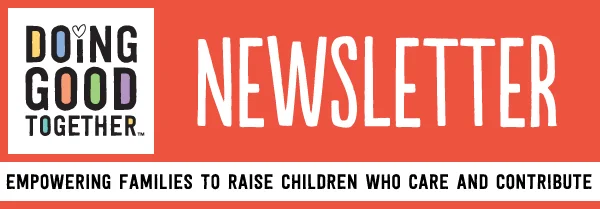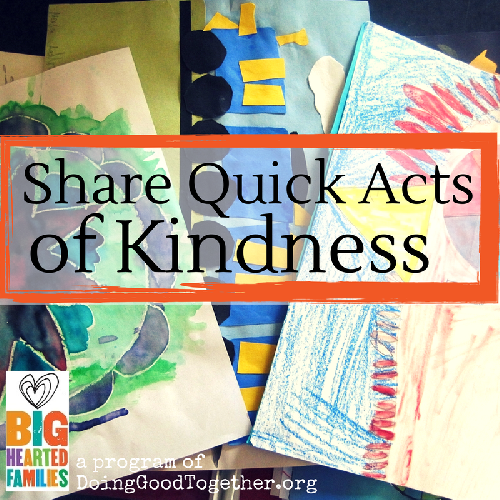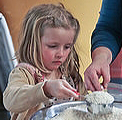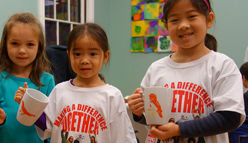LIVE KIND: COMPASSION AS A WAY OF LIFE
Random acts of kindness can be wonderful...and fun, but DGT's goal is to help families put an intentional, thoughtful and daily focus on compassion and giving. And that's more important than you might think. Harvard researchers found that a large majority of middle and high-school students believe (and are sure their parents and teachers agree) that personal success is more important than being a caring person. Is this really the message we want to convey to our children? You can counter this by sharing the kindness message with your children each day. Here are simple ways to weave generosity and empathy into your routine.
-Jenny Friedman, Executive Director
DAILY DOSES OF KINDNESS
Make a Difference.....
In the morning: Busy as mornings are, you can launch the day with heartfulness and joy.
- Daily Doses of Kindness DGT
- Consider a (very) brief mindfulness practice, such as enjoying a minute of silence at the breakfast table or taking 5 slow, deep breaths together while putting on coats and hats.
- Packing a snack for the kids? Routinely include extra grapes or goldfish crackers for your child to give another student who forgot their snack.
- As they head out the door, give your children a compliment and remind them to give one to somebody else during the day.
In the car: You have a captive audience. Use it to your advantage!
- Print and carry our list of 29 conversation starters. Car rides are often the best time for "big talks."
- Always keep kindness-themed books in the backseat for your kids to look at.
- Have a few homeless care kits on hand for anyone you encounter who might need some food...and cheer. Talk to your children about the importance of lending a hand to those in need.
- If your children share stories of problems with teachers or classmates, encourage them to spend a little time imagining the other person's perspective.
While running errands: Find opportunities to model kindness for your children.
- Ask the barista or store clerk how they're doing, and say "thank you" when served.
- Encourage your child to smile (the best and easiest act of kindness!) and to make eye contact when answering questions.
- Share quick acts of kindness
- Notice and comment on the kindness of others. "Wasn't that thoughtful of the woman to hold the door for us?" "It was so kind of the man to let us go in front of him in line." Reinforce any kind acts you see your child doing, too.
- Pick up an extra food item at the grocery to put in a special box at home. When it's full, donate it to your local food pantry.
- Indulge in a few fun acts of kindness, like paying for the person behind you in line at the coffee shop or taping a few quarters to a vending machine.
Before dinner: Another frantic time! Harness your children's energy for some team effort.
- As we've mentioned before, chores are an early important way to begin the conversation about contributing to the common good. Your little ones can feed the pets, set the table, or unload the dishwasher.
- Let them help make dinner. Depending on their ages, your kids can, say, assemble the ingredients, read the recipe, crack the eggs and top the pizzas.
During dinner: Establish a routine of chatting about important issues.
- Good (& Guilt Free) Deeds During Family Dinner
- One of our favorites: Each night, ask this question of every family member: "Who did you help today, and who helped you?" This encourages everyone to focus on giving and gratitude throughout the day.
- Other ideas for a meaningful dinnertime can be found on our blog.
Before bed: As your children wind down, take time for quiet togetherness.
- Read and talk. Check out our collection of big-hearted books, but remember that any book can spark important conversations if you ask the right questions.
- Sometimes a movie or TV show is just the right thing in the evening. Here are a few recommendations that will get you talking and thinking about others.
- Also before bed, have everyone list three joys from their day. Or three things they're grateful for.
On the weekend: Take on a family project and prepare for next week's kindnesses.
- Choose a simple, fun project that establishes a kindness routine. Some examples: decorate a box to sponsor a food shelf that you fill throughout the month; put plastic bags in your backpacks to have on hand for picking up litter; create a giving jar to teach charitable giving; make homeless care kits to keep in your car; or decorate kindness cards to give out randomly in the coming week.
- Put one family-friendly volunteer project on your calendar for the coming month.
MAKE CARING A HOT TOPIC
Talk About It.....
Researchers have found that families that talk about giving and serving are more likely to have children who take action. As you make kindness a routine, let your children know how much you value it. Say things like:
- Our family treats people with kindness and respect.
- We are the kind of family that helps people who are in need.
- I think caring for others is more important than a grade on a test.
- We help others when we can, but sometimes our family needs help, too. The world is a better place when people help each other out.
INSPIRATION
"If you want others to be happy, practice compassion. If you want to be happy, practice compassion."
-The Dalai Lama








